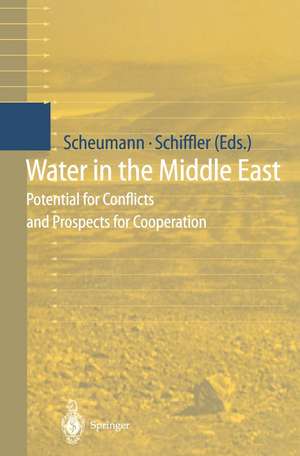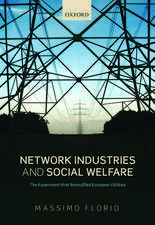Water in the Middle East: Potential for Conflicts and Prospects for Cooperation
Editat de Waltina Scheumann, Manuel Schiffleren Limba Engleză Paperback – 11 dec 2011
| Toate formatele și edițiile | Preț | Express |
|---|---|---|
| Paperback (1) | 636.12 lei 6-8 săpt. | |
| Springer Berlin, Heidelberg – 11 dec 2011 | 636.12 lei 6-8 săpt. | |
| Hardback (1) | 642.51 lei 6-8 săpt. | |
| Springer Berlin, Heidelberg – 4 mai 1998 | 642.51 lei 6-8 săpt. |
Preț: 636.12 lei
Preț vechi: 748.38 lei
-15% Nou
Puncte Express: 954
Preț estimativ în valută:
121.72€ • 127.54$ • 100.62£
121.72€ • 127.54$ • 100.62£
Carte tipărită la comandă
Livrare economică 11-25 aprilie
Preluare comenzi: 021 569.72.76
Specificații
ISBN-13: 9783642083761
ISBN-10: 3642083765
Pagini: 208
Ilustrații: XV, 191 p. 12 illus.
Dimensiuni: 155 x 235 x 11 mm
Greutate: 0.3 kg
Ediția:Softcover reprint of the original 1st ed. 1998
Editura: Springer Berlin, Heidelberg
Colecția Springer
Locul publicării:Berlin, Heidelberg, Germany
ISBN-10: 3642083765
Pagini: 208
Ilustrații: XV, 191 p. 12 illus.
Dimensiuni: 155 x 235 x 11 mm
Greutate: 0.3 kg
Ediția:Softcover reprint of the original 1st ed. 1998
Editura: Springer Berlin, Heidelberg
Colecția Springer
Locul publicării:Berlin, Heidelberg, Germany
Public țintă
ResearchDescriere
The fonner Egyptian Minister of State for Foreign Affairs and fonner UN Secre tary General, Butros Butros Ghali stated after the second Gulf War "The next war in the Middle East will not be fought for oil, but for water. " This famous statement has been echoed by many politicians: shortly before be coming president of Turkey, SOleyman Demirel declared that the waters of the Euphrates and Tigris belonged to Turkey, just as oil belongs to the Arabs. Rafael Eytan, at that time and now again Israeli Minister of Agriculture, declared in 1990 in full-page advertisements in the Jerusalem Post that Israel would never cede the West Bank to the Palestinians because Israel's water supply would otherwise be endangered. Finally, Ismail Serageldin, vice president of the World Bank, declared in 1995 that "the wars of the next century will be over water". These statements are typical of the atmosphere reigning in the Middle East and in several other places around the world concerning the issue of international fresh water resources. Whether these perceptions correspond to an actual threat to a nation's water supply or whether they correspond to the official position of states in negotiations often conducted secretly, is an entirely different matter. A closer analysis of the issue of international fresh water resources, as we attempt in this book, admittedly reveals a dangerous potential for conflict over water.
Cuprins
1 International Water Law: Regulations for Cooperation and the Discussion of the International Water Convention.- 2 International Water Agreements: A Comparative View.- 3 The Middle East Peace Process: Obstacles to Cooperation over Shared Waters.- 4 Transboundary Externalities and Regional Integration.- 5 Contested Waters: Dividing or Sharing?.- 6 The Jordan River Basin: Prospects for Cooperation Within the Middle East Peace Process?.- 7 Conflicts on the Euphrates: An Analysis of Water and Non-water Issues.
Textul de pe ultima copertă
In the 1980s, scientists, politicians and journalists frequently emphasized, particularly on the Jordan, Euphrates and Nile Rivers, that conflicts over shared water resources would lead to "water wars". A closer analysis shows that non-water issues have played the major role when conflicts in the region became heated, with the water issue being politically implemented. However, the unregulated and unequitable access to international rivers and the unilateral development of irrigated agriculture add to already high political tensions. The authors reveal that multilateral agreements over shared waters are a realistic option even in politically strained situations, if the expected costs of non-agreement are perceived as too high. If cooperation is beneficial to all Middle East nation states, it is easier to shift from overemphasis on national sovereignty to the concept of restricted national sovereignty and integrity which corresponds to international law.
Caracteristici
Das Buch diskutiert die Möglichkeiten des Wasser-Managements im Mittleren Osten.
















